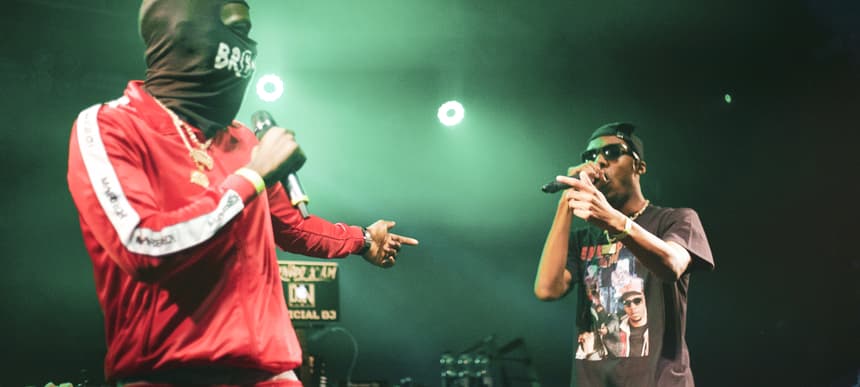
Behind Bars: After years of the UK banning music, attempts to censor drill break alarming new ground
Last week, the Lambeth Gangs Unit announced what they framed as a major victory in the fight against inner city violence. They handed out suspended custodial sentences to drill duo Skengdo x AM for the crime of performing “drill music that incited and encouraged violence against rival gang members and then posted it on social media.”
Full disclosure – I signed Skengdo x AM to my label. As such I don’t really want to write about the details of the case here; of course I’m partisan, and of course I think the judgement was deeply unfair. But while my own proximity to the case makes my position overly biased, it doesn’t change the fact that, as a music journalist and historian, I know these prison sentences represent a watershed moment for the censorship of culture, and one that we should be extremely concerned about.
There is a long history in Britain of censorship in pop music. I spent enough time researching this as the case progressed to tell you the amount of tunes that have been legislated against by the establishment is 1) staggering, and 2) a great indicator of what people will still be vibing to a couple of decades later.
You can go back to the early 20th Century and see the same arguments being fought between authority and cutting edge music that have resurfaced time and again. The beat may have changed, the bullshit stays the same.
In his written history of British nightlife, Life After Dark, Dave Haslam discussed the controversy the first wave of jazz encountered when it hit British shores in the 1910s; “there were fundamental objections to live jazz… musical experts, for example, denounced jazz as ‘rhythm without melody’. Various moral guardians objected to the ‘negro’ origin of the music”. This came to a head when Leyton council (unsuccessfully) attempted to shut down any venues hosting jazz dances, the outraged council – fuelled by a racist, hysterical right wing press (sound familiar?) – describing jazz dances as “morally bad”.
Inevitably, as time passed, jazz became acceptable in polite society, and the fear that it would ultimately destroy us all proved to be pearl-clutching nonsense. Fortunately for editors with newspapers to sell, a new bogeyman soon presented itself, in the form of rock ‘n’ roll.
Back in the ’50s, the media continued to make no attempt to hide overtly racist rhetoric. The Daily Mail set the tone with a notorious anti-rock ‘n’ roll editorial in 1956 that declared: “It has something of the African tom tom and voodoo dance [about it]. It is deplorable. It is tribal. And it is from America. It follows rag-time, dixie, jazz, hot cha cha and boogie woogie, which surely originated in the jungle. We sometimes wonder whether it is the negro’s revenge.”
One would wonder at the mindset that weighs Little Richard performing ‘Be Bop A Lula‘ as somehow equivalent ‘revenge’ for centuries of colonial brutality, but what do I know? As generally happens, the BBC fell into line and began to censor rock ‘n’ roll music, banning, amongst others, Chuck Berry’s ‘Maybellene‘, concerned that the lyrics which mentioned infidelity (Maybellene is cheating and Chuck is heartbroken) were potentially morally corrupting.
The Beeb followed this by going in hard on the next rock craze, known as death pop. This was the spate of songs that have now become definitive cultural markers of the rock ‘n’ roll era – the likes of ‘Leader of the Pack‘ or John Leyton’s ‘Johnny Remember Me‘. These tunes which dealt in highly melodramatic tales of rockers getting up to rocker-ish things i.e, racing bikes and dying in terrible crashes were considered certain to encourage listening teens into acts of vehicular lunacy. The BBC, and the wider media, also attributed these records as responsible for stirring up gang violence between Mods and Rockers, who were then kicking off mass pitched battles on the beaches of the country. This highlights another foible of the British press; if there’s no convenient ethnic minorities to demonise, they’ll take pops at the latest working class trends instead. So yeah, essentially, golden-oldie favourites The Shangri-Las were the #410 of 1965.
The ’70s saw the much-documented rise of punk, and the concurrent banning of the Sex Pistols both live and on air, alongside a court case that tried – unsuccessfully – to rule their album title ‘Never Mind the Bollocks’ to be criminally obscene. The ’80s had Frankie Goes To Hollywood’s synthetic sleaze banger ‘Relax‘ causing outrage for its risqué lyrics, anarcho punks Crass having pressing plants refusing to print their records because they were ‘blasphemous’ and U2 terrifying the board holders of Island Records by singing about the brutality of the British army in Northern Ireland. In the ’90s, rave bangers steamrolled over sensibilities with a slew of tracks built around gleefully obvious drug references – from D Mob’s ‘We Call it Acieeeed‘ to The Shamen’s chart-topping ode to getting smashed on Es, ‘Ebenezer Goode‘.
It continues.
Jungle; garage; grime; all of it was considered to be a public menace. Don’t play ‘Pow!‘ at carnival. Don’t let So Solid on telly. Don’t play bashment anywhere. Questions asked in parliament and coppers on telly stuttering over MC names. The same old merry-go-round with the same empty results. In the North, bassline was considered public enemy number one, and the spiritual home of the movement, Niche nightclub, was closed by the police. No dancing for you lot.
But none of all of this matches up to what happened last week – because no matter how many times the police have shut down a venue, or the BBC (or whichever radio station) has decided not to play a song, I cannot for the life of me find any examples of an artist being punished with a prison sentence for the simple act of performing a pop song.
The closest thing I can think of is the Criminal Justice Act of the ’90s, an anti-rave legislation dreamt up by a Conservative government that itself collapsed in a mire of sleaze and corruption. The CJA made it illegal to play any music “characterised by repetitive beats” to a gathering of ten or more people – it was an attempt to criminalise music itself. This legislation was greeted with outrage across the country. Huge street protests were organised, marches, raves and mass campaigns kicked off to fight against what was rightly seen as a ludicrous infringement of liberty.
Now Lambeth police have quietly pulled off the criminalisation of music – only this time there has been barely a murmur of dissent. I can only assume that people are content to see drill artists suffer draconian legislation because they have some vague notion that they must have committed some related crime to get their music banned. In the case of Skengdo x AM I can say that this is emphatically not the case – and you’ll notice that in the police press release there is no mention of any specific gang related crime that they have committed other than performing a song.
So there we are. Welcome to a game-changing moment; a time when the police have ruled that a single song is so very powerful that even performing it is illegal. I’m not sure how we’ve got here, but it’s a terrible place to be.
This article was written by Ian McQuaid - head of A&R at Moves Recordings.













